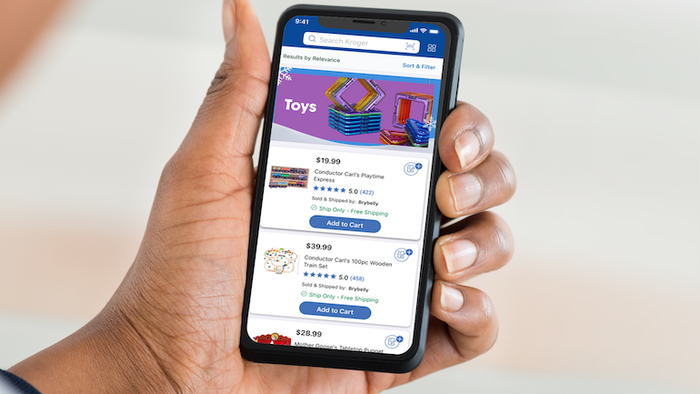Kroger to launch digital marketplace this fall
Partnership with e-commerce specialist Mirakl to extend Kroger Ship D-T-C platform beyond groceries.
August 11, 2020

The Kroger Co. is getting into the online marketplace business.
This fall, Kroger plans to go live with a digital marketplace of third-party sellers through a partnership with e-commerce provider Mirakl, which specializes in B2C and B2B e-marketplaces.
Kroger said Tuesday that, under the move, its Kroger Ship direct-to-customer platform will extend its ship-to-home assortment beyond groceries to a range of other categories, including natural and organic products, international food, specialty items, housewares and toys. Initially, more than 50,000 items will be available to customers, the Cincinnati-based retailer said. Eligible Kroger.com orders also will be able to earn loyalty rewards, such as fuel points.
“Our customers are increasingly turning to our e-commerce solutions provided at Kroger.com for their grocery and household essential needs. To better serve our customers, we’re continuing to invest in technology that enables us to expand our digital services to deliver anything, anytime, anywhere,” Jody Kalmbach, group vice president of product experience at Kroger, said in a statement. “Leveraging Mirakl’s best-in-class marketplace solution, we are broadening Kroger’s ship-to-home capabilities by offering more relevant products for our customers through exciting new partnerships with reputable third-party sellers.”
Launched in August 2018, Kroger Ship currently enables consumers to order from a selection of center-store groceries, pantry items and household essentials—including Kroger own-brand products—at ship.kroger.com and have them delivered to their door. Delivery is free for orders over $35 and $4.99 for smaller orders. Products offered via Kroger Ship are curated using data and insights from Kroger’s 84.51° digital intelligence arm.

An extension of the Ship service into a broader e-commerce marketplace would turn up the competitive heat on big retailers like Amazon, Walmart, Target and Costco Wholesale, given Kroger’s data, analytics and media muscle and its national scale. One of the world’s largest retailers, Kroger has nearly 2,800 stores in 35 states under two dozen banners and generates annual sales of more than $121 billion.
Kroger’s aim to stretch its online retail wings is evidenced by its efforts to build its own e-commerce infrastructure. In May 2018, Kroger unveiled a partnership with UK-based online grocer Ocado to build 20 automated customer fulfillment centers (CFCs) in the United States over three years. Running at around 350,000 square feet, the Ocado CFCs use automation and artificial intelligence to fill online orders. The companies said they plan to replicate the CFC model as they build the facilities across the U.S., extending Kroger’s online retail reach—possibly into new markets where it doesn’t have brick-and-mortar stores.
So far, Kroger has announced plans for nine CFCs (including two smaller facilities of 200,000 and 150,000 square feet), with the first slated to open in Monroe, Ohio, in early 2021. CFC locations include the Midwest, Mid-Atlantic, Southeast, Southwest and Pacific Northwest.
“The expansion of our Kroger Ship platform will continue to bring together our industry-leading customer insights and merchandising data to offer our customers a digital shopping experience that includes staples available in our physical stores as well as products that are exclusive to Kroger.com,” said Stuart Aitken, senior vice president and incoming chief merchant and marketing officer. “As part of our continuing transformation, we look forward to accelerating the development of our e-commerce platform and providing our customers with even more choices.”
In announcing the partnership with Boston-based Mirakl, Kroger said its e-commerce technology and channel investments under the Restock Kroger strategic plan are better enabling the company to respond to rising consumer demand for delivery, pickup and ship-to-home orders, especially during the COVID-19 pandemic. In the fiscal 2020 first quarter, Kroger’s digital sales jumped 92%.
According to Adrien Nussenbaum, co-founder and CEO of Mirakl, a digital marketplace is a natural next step for a retailer the size of Kroger.
“Kroger has long been a retail giant, and by integrating an online marketplace into its leading e-commerce experience, Kroger is continuing to lead from the front,” Nussenbaum stated. “It’s clearer than ever that digital marketplaces are the foundation of the next generation of commerce, and we look forward to supporting Kroger as it takes advantage of this opportunity.”
Albertsons Cos., the second-largest U.S. supermarket operator, behind Kroger, launched a Mirakl-powered online marketplace for third-party vendors in October 2018. Called the Albertsons Digital Marketplace, the virtual store offers thousands of specialty food and nonfood products, with a focus on natural, organic, ethnic and alternative products. The website currently says a “new and improved Marketplace experience” is coming “in the near future.”

About the Author(s)
You May Also Like


